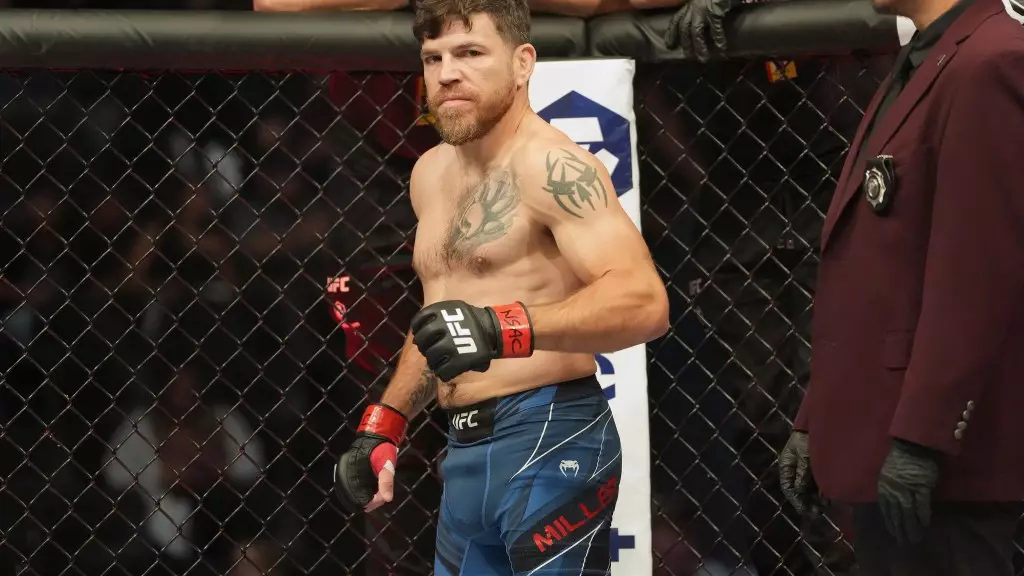Jim Miller is a name that resonates throughout the Ultimate Fighting Championship (UFC) community. With nearly 50 bouts to his name, the 41-year-old lightweight fighter holds an impressive record that includes victories at historic events like UFC 100, 200, and 300. Yet, behind this extraordinary resilience and accomplishments lies a strikingly relatable struggle: imposter syndrome. This self-perceived inadequacy plagues even those as accomplished as Miller, challenging the conventional expectations of what success should feel like. Although he is lauded as a seasoned veteran, Miller openly admits to grappling with feelings that undermine his confidence when advocating for himself within the sport.
Miller’s achievements are nothing short of monumental. He holds the UFC record for the most fights and wins, and after competing in a staggering 45 bouts, he has amassed a wealth of experience and accolades, such as 15 post-fight bonuses and numerous lightweight records. However, rather than embodying the archetypal superstar who confidently demands specific matchups, Miller approaches each negotiation with caution. He remarks, “My job is to fight, and that’s what I do. I’m not a matchmaker.” This philosophy reveals an innate humility that defines his character. Instead of leveraging his impressive credentials to elevate his own status, he remains committed to an ethos solely focused on competition—a sentiment that might perplex fans and analysts alike.
One might wonder how a fighter of Miller’s caliber can feel like an “imposter.” The intensity of the athlete’s life, along with the ever-pressuring environment of the UFC, contributes to this phenomenon. While not openly seeking special treatment, Miller acknowledges the respect he garners from his peers, including notable figures like Sean Shelby and Joe Rogan. Despite recognizing his standing as a seasoned fighter, he remains reluctant to capitalize on it to navigate the promotion’s matchmaking intricacies. “It’s hard, for me at least, to make some of those calls,” Miller confesses. This internal conflict illustrates his candid struggle with self-promotion amidst an environment where others with similar or less experience are often more vocal in their demands.
Miller’s reluctance to assert himself raises vital questions about the traditional dynamics between fighters and UFC officials. Are fighters obliged to advocate for themselves in ways that might detract from their focus on fighting? This broader implication speaks volumes about the diverse psychological battles athletes face in the high-stakes environment of professional sports. While Miller has fought to elevate his career in strenuous circumstances, he often refrains from direct requests. For instance, he hesitates to ask for a shift from lesser Apex events to coveted pay-per-view cards, despite knowing that his legacy affords him certain privileges. His reservations reflect a deeper issue of identity—a belief deeply rooted in humility that occasionally conflicts with industry norms.
Ultimately, Jim Miller epitomizes the notion that success in sports is not solely measured by titles and accolades but is also characterized by self-awareness and emotional honesty. In a sport where bravado dominates conversations and fighters often posture for power, Miller’s authenticity stands out as a refreshing contrast. By acknowledging his imposter syndrome, he reassures not just himself but also countless fans and aspiring fighters that vulnerability is a part of being a champion. Through this lens, Miller’s journey becomes a narrative not just of fights won but a profound exploration of personal growth and integrity within the demanding arena of mixed martial arts.
Jim Miller’s grappling with imposter syndrome continues to enrich his narrative as a UFC fighter. His self-reflection, combined with steadfast dedication to the craft of fighting, leaves fans and fellow combatants with an insightful reminder of the complexity and richness that define the journey of athletes at the highest level.

